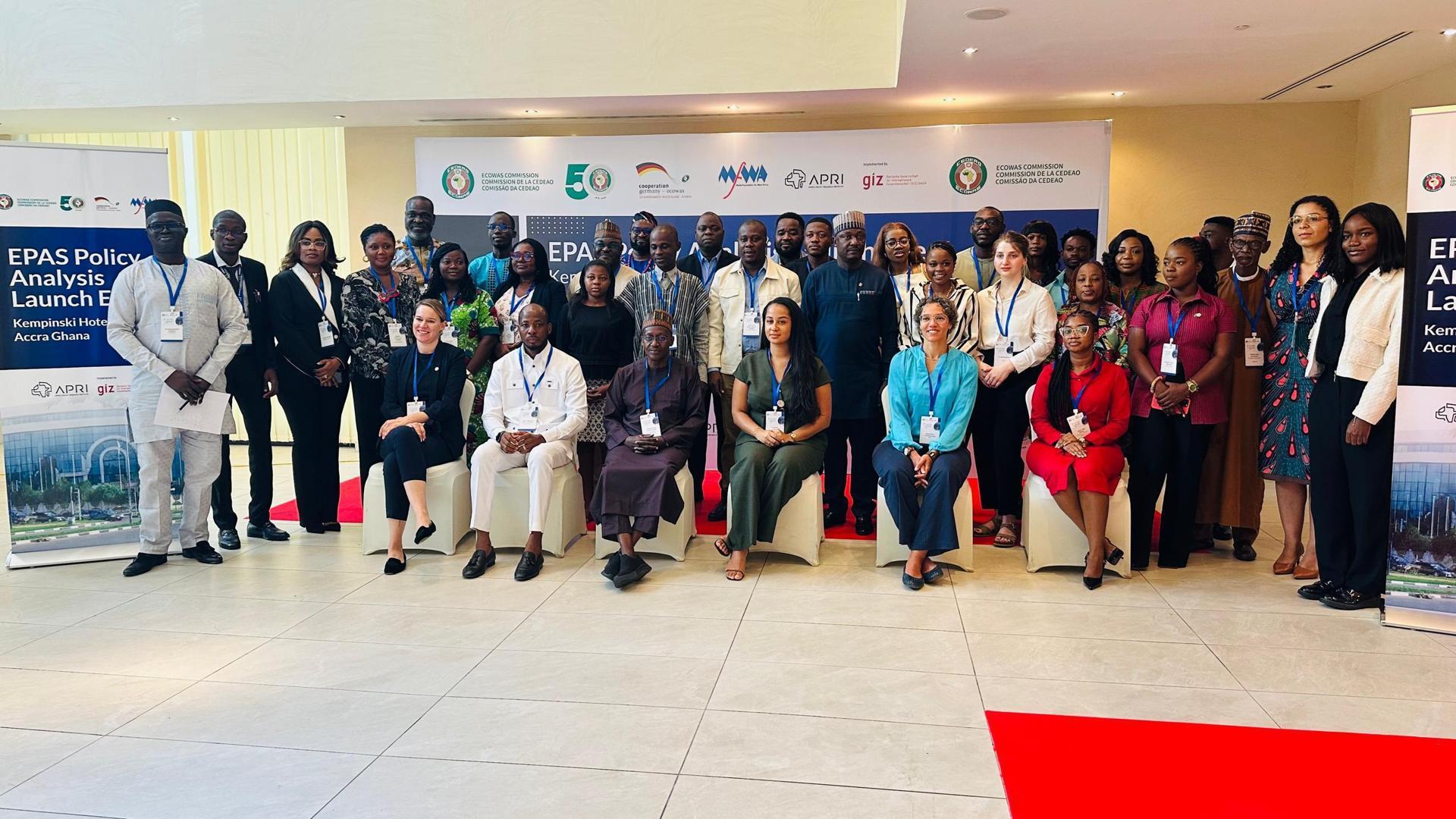Africa-Press – Ghana. Ambassador Mohammed Lawan Gana, ECOWAS Resident Representative to Ghana, has warned that the West African regional bloc stands at a critical crossroad.
He urged deep reforms and renewed political will to ensure ECOWAS remained responsive, people-centred, and resilient in the face of mounting challenges.
Speaking at the launch of the ECOWAS Policy Analysis Series (EPAS) in Accra, the Ambassador said: “Despite notable achievements such as trade liberalization and protocols on free movement, implementation remains a glaring challenge.”
“Today’s ECOWAS must be re-evaluated if it is to meet the demands of a rapidly evolving geopolitical environment,” he noted.
The policy dialogue was held in partnership with the German Development Cooperation (GIZ), the Africa Policy Research Institute (APRI), and the Legon Centre for International Affairs and Diplomacy (LECIAD).
It brought together a cross-section of policymakers, researchers, civil society actors, youth leaders, and development partners to reflect on ECOWAS’ 50-year journey and chart a forward-looking agenda under its Vision 2050.
With over 60 attendees drawn from across West Africa, the event served as a platform for dynamic exchange and co-creation of solutions.
Ambassador Gana highlighted a number of persistent challenges, including security instability, lack of infrastructure, weak policy harmonisation, and the limited economic diversification of member states.
He also pointed to worrying trends such as youth exclusion, visa inconsistencies, and climate vulnerability.
“We live in a fiercely competitive global environment,” he said, citing rising geopolitical tensions and the growing influence of foreign actors such as Russia, China, Turkey, and the Gulf States in West Africa.
He said, “The region is becoming a theatre for proxy struggles. ECOWAS must not only adapt but lead with vision, unity, and inclusion.”
Ambassador Gana further urged, “We must move from an ECOWAS of states to an ECOWAS of the people. Vision 2050 must not be a document on paper, but a roadmap for action.”
The launch event marked the unveiling of 14 empirical policy papers, collectively known as the ECOWAS Policy Analysis Series, commissioned by the ECOWAS Commission with financial and technical support from GIZ and Germany’s Federal Ministry for Economic Cooperation and Development (BMZ), with co-financing from the European Union.
The papers examine a wide range of thematic areas, including migration, democracy, gender, climate, digitalization, health, trade, peace and security, and ECOWAS institutional reform.
Chantel Kristin Bredua Lahmer, a representative of the German Embassy in Ghana, reiterated the Ambassador’s call for deeper engagement with citizens and civil society in regional governance.
“Why does my voice matter in ECOWAS? That’s the central question guiding today’s conversation,” she said, adding that “Citizens are not just passive recipients of policies, they are active stakeholders whose insights shape legitimate and responsive governance.”
She emphasized that inclusive policymaking must be underpinned by open dialogue, trust, and effective communication, especially in an era marked by disinformation and declining confidence in institutions.
Ms Lahmer said, “Communication is not optional, it is our responsibility. This is about fostering long-term relationships and building institutions that listen and deliver.”
She highlighted the symbolic timing of the event, which comes ahead of two major milestones: ECOWAS’ 50th anniversary in May 2025 and 50 years of German-Ghanaian bilateral development cooperation.
“These anniversaries underline the enduring value of partnerships and the shared commitment to democratic values and regional integration.”
The broader project falls under the GIZ-implemented Support to the ECOWAS Commission on Organisational Development (ODII), which seeks to enhance the Commission’s ability to deliver effectively and communicate its impact across the region.
A standalone BMZ-funded component focuses specifically on countering misinformation and improving ECOWAS’ internal and external communication.
Dr. Kojo Impraim, Director for Media for Peace and Social Cohesion at the Media Foundation for West Africa (MFWA), challenged participants to take stock not only of ECOWAS’ accomplishments, but also its missed opportunities.
“To evaluate ECOWAS at 50, we need to ask six key questions: What progress have we made? What opportunities have we seized, or missed? What lessons have we learned? What challenges remain? And how do we reform moving forward?” he questioned.
Dr. Impraim praised ECOWAS’ historical role in peacebuilding, mediation, and regional cooperation, but lamented stagnation in flagship initiatives.
He emphasized the critical role of digital infrastructure, cybersecurity, and regional media in combating misinformation, building civic engagement, and enhancing democratic governance.
“Civil society and media must work with ECOWAS to counter violent extremism, safeguard digital rights, and support inclusive governance across the region,” he urged.
The event featured panel discussions and breakout sessions, each dedicated to one of the 14 thematic areas. Authors of the policy papers presented their research and engaged directly with participants, receiving feedback and suggestions in moderated dialogues.
For More News And Analysis About Ghana Follow Africa-Press







